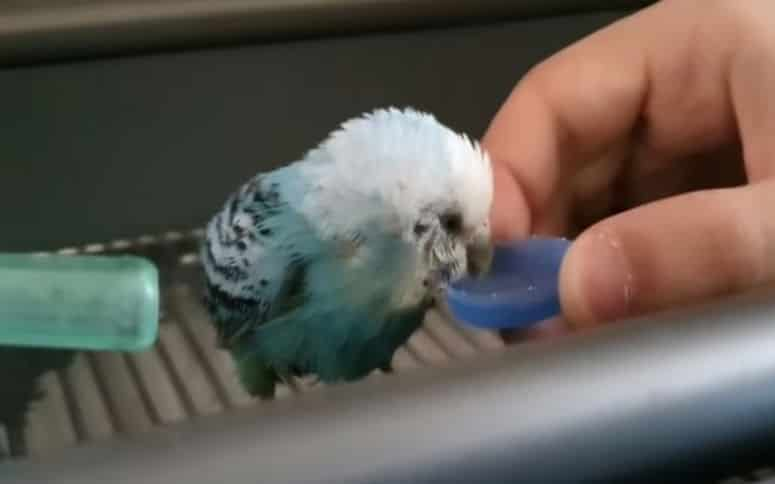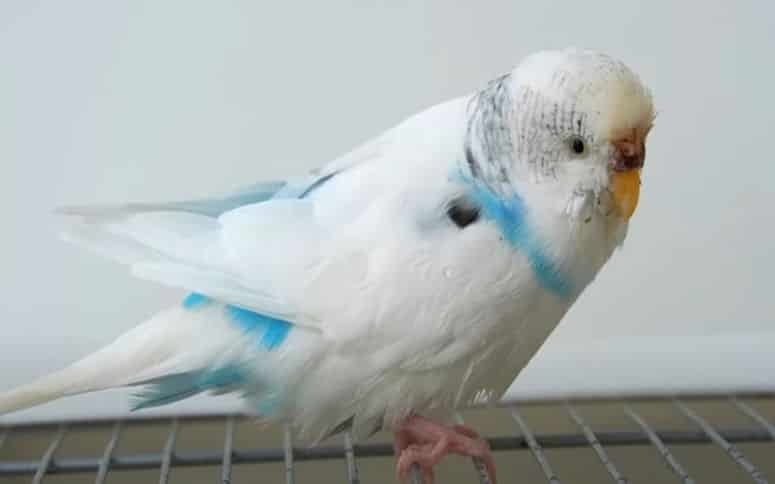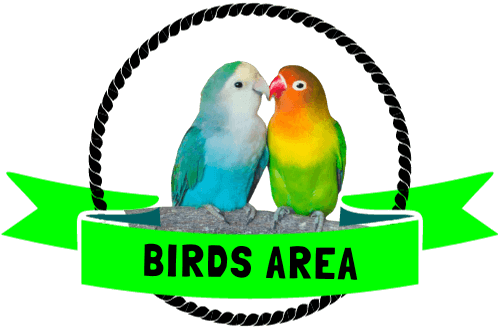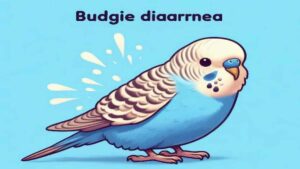Budgie Dying of Old Age
A budgie dying of old age may show signs of trouble breathing, unhealthy-looking feathers, strange faeces, vomiting, lethargy, and lack of appetite. Whether due to old age or illness, preparing ways to comfort the bird in its final hours when caring for a dying budgie is vital.
If your budgie is old and showing symptoms like being fluffed up, breathing heavily, and shaking, there may not be anything precisely wrong other than old age.
However, it’s crucial to handle a budgie’s death with care, especially if there are other budgies in the cage. While old age is not a disease, if your budgie displays signs of any medical problem, it should be seen by a vet.
For more, scroll down.
Budgie Dying of Old Age

I’m sorry to hear that your budgie is nearing the end of its life due to old age. It’s essential to provide comfort and care to your beloved pet.
Here are some things you can do to help ensure your budgie’s comfort and well-being as it approaches the end of its life:
- Keep it comfortable: Ensure your budgie has a warm and quiet resting place. Maintain a comfortable temperature in its environment to prevent it from getting too cold.
- Provide soft bedding: To make the budgie’s cage as cozy as possible, offer soft and comfortable bedding. Budgies may appreciate a soft towel or cloth to rest on.
- Offer food and water: Make sure your budgie has access to fresh water and a soft food mixture, such as mashed fruits and vegetables, which are easier for older budgies to consume. You may also provide millet sprays or other favored treats.
- Spend time with your budgie: Be near your budgie and talk to it softly, providing reassurance and companionship. Even though it may be less active due to age, your presence can offer comfort.
- Gentle handling: If your budgie enjoys being handled, provide gentle and loving interactions. However, be careful not to cause any stress or discomfort.
- Keep the environment quiet: Reduce noise and disturbances in the area where your budgie is resting. This can help minimize stress during this delicate time.
- Observe for signs of distress: Pay close attention to your budgie’s behavior and condition. If you notice any signs of severe discomfort or pain, consult with a veterinarian to determine if there are any humane options to alleviate suffering.
Ultimately, as a budgie nears the end of its life due to old age, your primary goal should be to ensure it is comfortable and loved.
While it’s difficult to see a beloved pet nearing the end of its life, providing a peaceful and supportive environment can make the transition as comfortable as possible.
How Do I Know If My Budgie Is Dying Of Old Age? 6 Signs Of A Dying Budgie

Budgies typically have a lifespan of around 5 to 10 years, although some can live longer with proper care. As they age, they may experience various health issues and eventually pass away of old age.
Here are some signs that a budgie may be nearing the end of its life due to old age:
Trouble Breathing
Budgies nearing the end of their life may experience difficulty breathing. You may notice that your budgie is breathing heavily or struggling for breath. However, this can be a sign of aging organs or respiratory issues.
Unhealthy-looking Feathers
The feathers of a dying budgie may appear unhealthy or disheveled. They may be dull in color, frayed, or even fall out easily. This can result from the bird’s declining health and weakened immune system.
Strange Feces
Changes in feces can indicate a budgie’s deteriorating health. If you notice abnormal colors, consistency, or odor in their droppings, it could be a sign that their digestive system is struggling due to old age.
Vomiting
Budgies nearing the end of their life may experience episodes of vomiting. Therefore, this can result from various underlying health issues, including organ failure or a weakened immune system.
Lethargy
Dying budgies often display a significant decrease in energy and overall activity. They may spend more time sleeping or sitting quietly in one place. Moreover, this lack of energy is a common symptom of old age.
Lack Of Appetite
A dying budgie may lose interest in their food and have a decreased appetite. They may only nibble at their food or refuse to eat altogether. This can be due to their declining health or discomfort.
As budgies age, they are prone to specific health issues that indicate they are nearing the end of their life.
Budgie owners need to be aware of the signs that their beloved pet may be dying so that they can provide the necessary care and support during this difficult time.
How To Comfort A Dying Budgie (from Old Age, Not Sickness)
Comforting a dying budgie from old age is a compassionate and emotionally challenging process. While it’s essential to remember that old age is not a disease, providing care and support in their final moments is crucial.
Here are some ways to comfort a budgie in its last stages of life:
- Create a Quiet Environment: Provide a calm and peaceful space for your budgie’s final hours.
- Maintain a Comfortable Temperature: Ensure the temperature in the room is suitable for your budgie, neither too cold nor too hot.
- Offer Gentle Interaction: Sit near your budgie and softly speak or sing to provide a sense of companionship.
- Provide Familiar Surroundings: Keep your budgie in its usual cage and surroundings to provide comfort and security.
- Offer Favorite Foods: If your budgie still has an appetite, provide its favorite foods to entice eating.
- Keep Hydrated: Ensure a source of fresh water is available to your budgie.
- Administer Medications (if Necessary): If your budgie is on medication, follow the prescribed dosage and instructions.
- Minimize Stress: Avoid loud noises, sudden movements, and other stress-inducing factors.
- Monitor Comfort Level: Observe your budgie closely for any signs of distress or pain and adjust its surroundings accordingly.
How To Handle The Death Of A Budgie (old Age) Considering The Other Budgies In The Cage
Dealing with the death of a budgie due to old age while considering the other budgies in the cage can be a sensitive situation.
Here’s how to handle it:
| Step | Action |
|---|---|
| Isolate the Deceased Budgie | Remove the deceased budgie promptly from the cage to prevent distress or attempts to revive from the living budgies. |
| Monitor the Surviving Budgies | Keep a close eye on the remaining budgies for signs of stress or grief, such as changes in behavior or appetite. |
| Provide Comfort | Offer extra attention and companionship to the surviving budgies. Spend time near the cage, talk to them, be supportive. |
| Observe Their Interaction | Watch how the surviving budgies interact with each other. Some may form closer bonds to compensate for the loss. |
| Consider a Companion | Introduce a new budgie cautiously, considering individual reactions. Not all budgies may readily accept new cage mates. |
| Maintain Routine | Keep daily routines consistent to reduce stress. Stick to regular feeding times, play sessions, and sleep schedules. |
| Consult a Veterinarian | If severe changes in behavior persist, consult a vet for advice on helping the surviving budgies adjust and cope. |
Handling a budgie’s death while considering the other birds’ well-being involves sensitivity and observation to ensure their emotional and physical needs are met during this challenging time.
Coping With The Death Of A Budgie Due To Old Age

Caring for my aging budgie was challenging, but knowing that budgies typically live for 5 to 10 years helped me prepare. Their short lifespan is offset by the joy and companionship they bring.
For example, my budgie lived for 8 years, and during that time, we formed a strong bond. Providing the right diet, attention, and regular vet check-ups was crucial in ensuring a longer, healthier life.
Understanding the signs of aging, like feather changes and reduced activity, helped me provide better care. While old age is not a disease, seeking veterinary advice when necessary is essential.
However, it’s all about giving our feathered friends the best possible life during their time with us.
Is a 4-Year-Old Budgie Old?
A budgie at 4 years old is not considered old. Budgies, also known as parakeets, have an average lifespan of 5 to 10 years. So, a 4-year-old budgie can be considered middle-aged rather than old.
However, it’s essential to remember that individual budgies may age differently, depending on various factors such as diet, genetics, and overall health.
Here are some factors to consider when determining if a 4-year old budgie is old:
- Physical signs: Look for any physical signs of aging, such as decreased activity levels, changes in feather appearance or quality, signs of arthritis, or difficulty in maintaining balance.
- Behavioral changes: Pay attention to any changes in behavior, such as decreased vocalization, decreased interaction, or changes in sleep patterns.
- Health conditions: Keep an eye out for any age-related health issues such as respiratory problems, digestive issues, or weight changes.
Although a 4-year-old budgie might not be considered old, providing them with appropriate care and monitoring their health regularly is essential. Regular veterinary check-ups and a balanced diet can help ensure their well-being as they age.
Remember, each budgie is unique, and their longevity can vary. By providing proper care and attention, you can help your budgie live a happy and healthy life, regardless of age.
How Long Can A Sick Budgie Live?

The lifespan of a sick budgie, or any pet bird, can vary widely depending on the nature and severity of the illness, as well as the quality of care it receives.
Budgies, or parakeets, are small parrots that can live for several years under normal, healthy conditions.
When a budgie becomes sick, its lifespan can be significantly affected. Here are some factors to consider when determining how long a sick budgie can live:
Nature of Illness
The kind of ailment a budgie faces can significantly influence its lifespan. While certain conditions can be severe, reducing life expectancy, others might be manageable with the right interventions, enabling the bird to lead a prolonged life.
The Power of Early Intervention
Spotting and addressing an illness at its inception can significantly improve a budgie’s chances of a longer life.
Hence, owners must schedule consistent vet visits and stay vigilant for any unusual shifts in their budgie’s demeanor or physical appearance.
Prioritizing Quality Care
A sick budgie’s quality of life and lifespan largely hinges on the level of care it receives. However, this encompasses a nutritious diet, a hygienic and cozy habitat, timely medical interventions, and the warmth of emotional connection.
Budgie’s Individual Resilience
Just like humans, every budgie is unique. Some might demonstrate remarkable recovery abilities and thrive for more extended periods even when ill, while others might find it more challenging.
Remember, it’s crucial to consult with an avian veterinarian for a proper diagnosis and guidance on how to care for a sick budgie. They can provide expert advice tailored to your budgie’s condition and help ensure their well-being.
Frequently Asked Questions Of Budgie Dying Of Old Age
Can budgies die suddenly without showing signs of aging?
Is there anything specific I should feed an aging budgie?
How can I tell if my budgie is in pain?
Should I take my aging budgie to the vet?
Sum Up
As your beloved budgie reaches the end of its life due to old age, it’s essential to provide comfort and support.
Recognize the signs like trouble breathing, unhealthy feathers, strange feces, vomiting, lethargy, and lack of appetite. Although old age is not a disease, if your budgie shows any medical concerns, seek professional advice.
A decrease or increase in appetite, unkept feathers, and increased drinking might also indicate nearing the end.
Remember, your budgie deserves care and compassion in its final hours. Offer a peaceful environment and cherish the moments you have left together.
What Are the Causes of Budgies Bird Dying?
Common causes of budgie bird deaths include respiratory infections, liver disease, nutritional deficiencies, and accidents. To learn more, watch the video “Reasons for Budgie Bird Deaths.”







